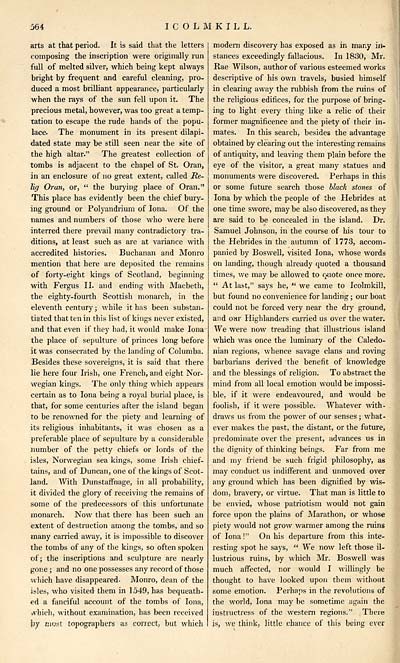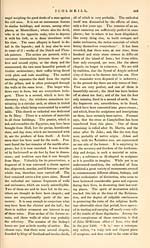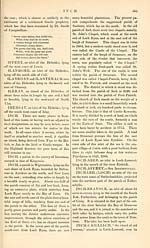Gazetteer of Scotland > Volume 2
(80) Page 564
Download files
Complete book:
Individual page:
Thumbnail gallery: Grid view | List view

564
ICOLMKILL.
arts at that period. It is said that the letters
composing the inscription were originally run
full of melted silver, which being kept always
bright by frequent and careful cleaning, pro-
duced a most brilliant appearance, particularly
when the rays of the sun fell upon it. The
precious metal, however, was too great a temp-
tation to escape the rude hands of the popu-
lace. The monument in its present dilapi-
dated state may be still seen near the site of
the high altar." The greatest collection of
tombs is adjacent to the chapel of St. Oran,
in an enclosure of no great extent, called Re-
lig Oran, or, " the burying place of Oran."
This place has evidently been the chief bury-
ing ground or Polyandrium of Iona. Of the
names and numbers of those who were here
interred there prevail many contradictory tra-
ditions, at least such as are at variance with
accredited histories. Buchanan and Monro
mention that here are deposited the remains
of forty-eight kings of Scotland, beginning
with Fergus II. and ending with Macbeth,
the eighty-fourth Scottish monarch, in the
eleventh century ; while it has been substan-
tiated that ten in this list of kings never existed,
and that even if they had, it would make Iona
the place of sepulture of princes long before
it was consecrated by the landing of Columba.
Besides these sovereigns, it is said that there
lie here four Irish, one French, and eight Nor-
wegian kings. The only thing which appears
certain as to Iona being a royal burial place, is
that, for some centuries after the island began
to be renowned for the piety and learning of
its religious inhabitants, it was chosen as a
preferable place of sepulture by a considerable
number of the petty chiefs or lords of the
isles, Norwegian sea kings, some Irish chief-
tains, and of Duncan, one of the kings of Scot-
land. With Dunstaffnage, in all probability,
it divided the glory of receiving the remains of
some of the predecessors of this unfortunate
monarch. Now that there has been such an
extent of destruction among the tombs, and so
many carried away, it is impossible to discover
the tombs of any of the kings, so often spoken
of; the inscriptions and sculpture are nearly
gone ; and no one possesses any record of those
which have disappeared. Monro, dean of the
isles, who visited them in 1549, has bequeath-
ed a fanciful account of the tombs of Iona,
A'hich, without examination, has been received
by most topographers as correct, but which
modern discovery has exposed as in many in-
stances exceedingly fallacious. In 1830, Mr.
Rae Wilson, author of various esteemed works
descriptive of his own travels, busied himself
in clearing away the rubbish from the ruins of
the religious edifices, for the purpose of bring-
ing to light every thing like a relic of their
former magnificence and the piety of their in-
mates. In this search, besides the advantage
obtained by clearing out the interesting remains
of antiquity, and leaving them plain before the
eye of the visitor, a great many statues and
monuments were discovered. Perhaps in this
or some future search those black stones of
Iona by which the people of the Hebrides at
one time swore, may be also discovered, as they
are said to be concealed in the island. Dr.
Samuel Johnson, in the course of his tour to
the Hebrides in the autumn of 1773, accom-
panied by Boswell, visited Iona, whose words
on landing, though already quoted a thousand
times, we may be allowed to quote once more.
" At last," says he, " we came to Icolmkill,
but found no convenience for landing ; our boat
could not be forced very near the diy ground,
and our Highlanders carried us over the water.
We were now treading that illustrious island
which was once the luminary of the Caledo-
nian regions, whence savage clans and roving
barbarians derived the benefit of knowledge
and the blessings of religion. To abstract the
mind from all local emotion would be impossi-
ble, if it were endeavoured, and would be
foolish, if it were possible. Whatever with-
draws us from the power of our senses ; what-
ever makes the past, the distant, or the future,
predominate over the present, advances us in
the dignity of thinking beings. Far from me
and my friend be such frigid philosophy, as
may conduct us indifferent and unmoved over
any ground which has been dignified by wis-
dom, bravery, or virtue. That man is little to
be envied, whose patriotism would not gain
force upon the plains of Marathon, or whose
piety would not grow warmer among the ruins
of Iona!" On his departure from this inte-
resting spot he says, " We now left those il-
lustrious ruins, by which Mr. Boswell was
much affected, nor would I willingly be
thought to have looked upon them without
some emotion. Perhaps in the revolutions of
the world, Iona may be sometime again the
instructress of the western regions." There
js, we think, little chance of this being ever
ICOLMKILL.
arts at that period. It is said that the letters
composing the inscription were originally run
full of melted silver, which being kept always
bright by frequent and careful cleaning, pro-
duced a most brilliant appearance, particularly
when the rays of the sun fell upon it. The
precious metal, however, was too great a temp-
tation to escape the rude hands of the popu-
lace. The monument in its present dilapi-
dated state may be still seen near the site of
the high altar." The greatest collection of
tombs is adjacent to the chapel of St. Oran,
in an enclosure of no great extent, called Re-
lig Oran, or, " the burying place of Oran."
This place has evidently been the chief bury-
ing ground or Polyandrium of Iona. Of the
names and numbers of those who were here
interred there prevail many contradictory tra-
ditions, at least such as are at variance with
accredited histories. Buchanan and Monro
mention that here are deposited the remains
of forty-eight kings of Scotland, beginning
with Fergus II. and ending with Macbeth,
the eighty-fourth Scottish monarch, in the
eleventh century ; while it has been substan-
tiated that ten in this list of kings never existed,
and that even if they had, it would make Iona
the place of sepulture of princes long before
it was consecrated by the landing of Columba.
Besides these sovereigns, it is said that there
lie here four Irish, one French, and eight Nor-
wegian kings. The only thing which appears
certain as to Iona being a royal burial place, is
that, for some centuries after the island began
to be renowned for the piety and learning of
its religious inhabitants, it was chosen as a
preferable place of sepulture by a considerable
number of the petty chiefs or lords of the
isles, Norwegian sea kings, some Irish chief-
tains, and of Duncan, one of the kings of Scot-
land. With Dunstaffnage, in all probability,
it divided the glory of receiving the remains of
some of the predecessors of this unfortunate
monarch. Now that there has been such an
extent of destruction among the tombs, and so
many carried away, it is impossible to discover
the tombs of any of the kings, so often spoken
of; the inscriptions and sculpture are nearly
gone ; and no one possesses any record of those
which have disappeared. Monro, dean of the
isles, who visited them in 1549, has bequeath-
ed a fanciful account of the tombs of Iona,
A'hich, without examination, has been received
by most topographers as correct, but which
modern discovery has exposed as in many in-
stances exceedingly fallacious. In 1830, Mr.
Rae Wilson, author of various esteemed works
descriptive of his own travels, busied himself
in clearing away the rubbish from the ruins of
the religious edifices, for the purpose of bring-
ing to light every thing like a relic of their
former magnificence and the piety of their in-
mates. In this search, besides the advantage
obtained by clearing out the interesting remains
of antiquity, and leaving them plain before the
eye of the visitor, a great many statues and
monuments were discovered. Perhaps in this
or some future search those black stones of
Iona by which the people of the Hebrides at
one time swore, may be also discovered, as they
are said to be concealed in the island. Dr.
Samuel Johnson, in the course of his tour to
the Hebrides in the autumn of 1773, accom-
panied by Boswell, visited Iona, whose words
on landing, though already quoted a thousand
times, we may be allowed to quote once more.
" At last," says he, " we came to Icolmkill,
but found no convenience for landing ; our boat
could not be forced very near the diy ground,
and our Highlanders carried us over the water.
We were now treading that illustrious island
which was once the luminary of the Caledo-
nian regions, whence savage clans and roving
barbarians derived the benefit of knowledge
and the blessings of religion. To abstract the
mind from all local emotion would be impossi-
ble, if it were endeavoured, and would be
foolish, if it were possible. Whatever with-
draws us from the power of our senses ; what-
ever makes the past, the distant, or the future,
predominate over the present, advances us in
the dignity of thinking beings. Far from me
and my friend be such frigid philosophy, as
may conduct us indifferent and unmoved over
any ground which has been dignified by wis-
dom, bravery, or virtue. That man is little to
be envied, whose patriotism would not gain
force upon the plains of Marathon, or whose
piety would not grow warmer among the ruins
of Iona!" On his departure from this inte-
resting spot he says, " We now left those il-
lustrious ruins, by which Mr. Boswell was
much affected, nor would I willingly be
thought to have looked upon them without
some emotion. Perhaps in the revolutions of
the world, Iona may be sometime again the
instructress of the western regions." There
js, we think, little chance of this being ever
Set display mode to: Large image | Transcription
Images and transcriptions on this page, including medium image downloads, may be used under the Creative Commons Attribution 4.0 International Licence unless otherwise stated. ![]()
| Gazetteers of Scotland, 1803-1901 > Gazetteer of Scotland > Volume 2 > (80) Page 564 |
|---|
| Permanent URL | https://digital.nls.uk/97431782 |
|---|
| Description | Volume II: Glenbanchor to Zetland. |
|---|---|
| Attribution and copyright: |
|
| Description | By Robert Chambers and William Chambers. Glasgow: Blackie & Son, 1838. 2 volumes. |
|---|---|
| Shelfmark | NF.1461.g.7 |
| Additional NLS resources: | |

